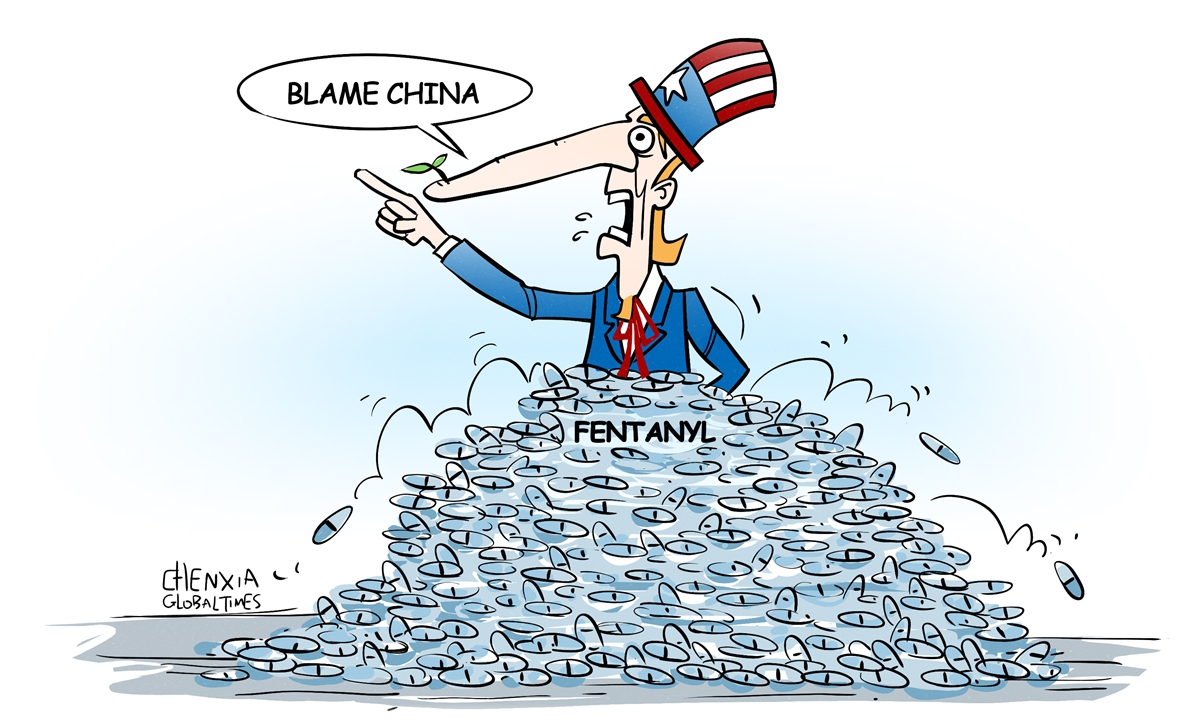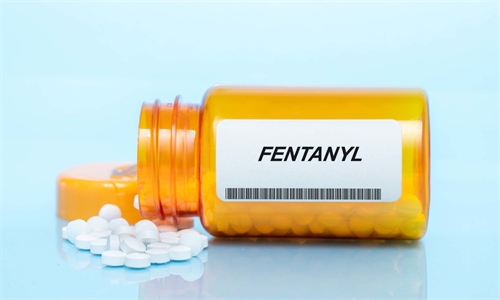
Illustration: Chen Xia/GT
China's approach to cooperating with the US on drug control stems from a deep commitment to global health, security and well-being. With a humanitarian spirit and a sense of responsibility, China assists the US in tackling its drug challenges, understanding that the dangers posed by drugs cross borders and necessitate a united international response. This stance is evident in China's policies and actions, which focus on protecting its citizens while also aiming to support global efforts against drug trafficking.Even during turbulent times in China-US relations, China has actively cooperated with US law enforcement agencies. In 2019, coordinated efforts between the two countries' law enforcement led to the capture of a fentanyl trafficking ring. During the China-US summit meeting in San Francisco in November 2023, China, maintaining a responsible attitude and viewing drug control as vital for the common well-being of humanity, agreed to establish a dialogue mechanism for anti-drug cooperation between the two countries in this area.
On January 30, 2024, Chinese State Councilor and Director of the China National Narcotic Control Committee Wang Xiaohong met with the US delegation led by Deputy Assistant to the US President and Deputy Homeland Security Advisor Jen Daskal in Beijing. This meeting officially announced the inauguration of the China-US counternarcotics working group, marking a significant step toward implementing the drug cooperation vision outlined at the China-US San Francisco summit and establishing a solid framework for practical collaboration at the national level. On February 18, Wang met with US Secretary of Homeland Security Alejandro N. Mayorkas in Vienna, where both sides engaged in candid, in-depth, and constructive discussions on advancing drug control and law enforcement cooperation. This laid the groundwork for strengthening China-US drug control collaboration and led to tangible progress in areas such as regulated substances, intelligence sharing and case cooperation.
In June 2024, leveraging the drug control cooperation mechanism, China and the US worked together to combat large-scale money laundering activities related to drug trafficking. At the same time, China also announced plans to add 46 new psychoactive substances to its controlled substances list as it intensifies efforts to combat drug manufacturing, trafficking and abuse. This not only highlights the effectiveness of the cooperation mechanism but also underscores the importance of maintaining a partnership between the law enforcement agencies of China and the US.
Through the cooperation mechanism, China and the US have also achieved technical exchanges in the field of drug control. Relevant technical experts from both countries held exchanges in February and March 2024. Experience has shown that by sharing best practices and advancements in drug detection technologies, the two countries have significantly enhanced their ability to intercept and analyze drug shipments.
China has adopted a highly responsible and proactive attitude toward cooperation with the US in drug control. Unfortunately, despite the evidence that genuine collaboration benefits both sides, the US often introduces discord into the partnership, particularly when hyping up the "China responsibility" rhetoric. Such irresponsible statements not only undermine the cooperative atmosphere but also weaken the effectiveness of joint efforts to tackle global drug issues. The US needs to change this misguided approach as soon as possible.
By adopting a cooperative and responsible attitude, the US can better address its drug issues with China's support. The US should demonstrate sincerity and goodwill in advancing drug control cooperation, actively collaborating with China to more effectively tackle the drug crisis it faces. While China is actively promoting cooperation with a responsible attitude, the US should respond with the same level of commitment and responsibility. Only in this way can the two countries make significant progress in their joint efforts to combat global drug issues, creating a safer and healthier world for future generations.
The author is a professor at the School of International Relations and Public Affairs of Fudan University. opinion@globaltimes.com.cn

